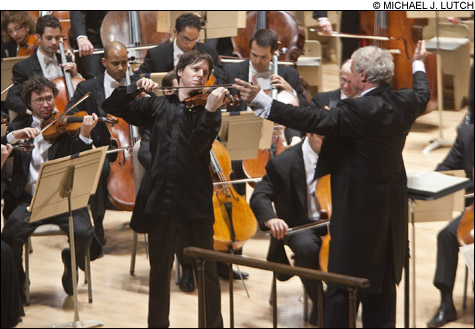
BORING BRAHMS: Yan Pascal Tortelier's admirable accompaniment couldn't save Joshua Bell's performance of the Violin Concerto. |
In my review of the memorable Brahms performances Sir Simon Rattle led with the Berlin Philharmonic Orchestra for the Celebrity Series of Boston last month, I should have mentioned that one decision responsible for the beauty and spaciousness of the orchestral sound was the placement of the first and second violin sections on opposite sides of the stage (just as James Levine does with the BSO). This is especially helpful in Brahms, whose dense orchestration can turn thick and heavy.
That's what happened when BSO conductor emeritus Bernard Haitink, celebrating his 80th-birthday year, led Brahms's First Symphony the week following the Berliners' visit. Rattle encouraged us to hear interior dialogue; Haitink chose to consolidate rather than separate the violin sections, giving us stentorian monotone and strenuous effort instead of the interior drama of Brahms in conflict with his inner demons in this most conflicted of his symphonies. The performance was intense but not lovable or moving — certainly not one that explored or expanded my sense of the music.
Haitink began with Debussy's Nocturnes, which was diaphanously played (Debussy has already done the work of aerating the sound), and followed it, in honor of the 70th birthday of Sir James Galway, with Ibert's Flute Concerto, a witty and seductive piece requiring effortless mastery. Galway's mastery is no longer effortless or complete, and I wouldn't call his playing either here or in his encore, Debussy's Syrinx for solo flute, particularly seductive. But in his brocade jacket and oversized white vest, he's still a crowd pleaser.
Even better BSO Debussy — and more Brahms — came the following week, with French conductor Yan Pascal Tortelier replacing Andrew Davis, who had to deal with an illness in his family. Tortelier, the son of the distinguished cellist Paul Tortelier, was last here in 2006, replacing Kurt Masur with the London Philharmonic Orchestra in a Celebrity Series event. I had some doubts about his peculiar technique: his arms are both floppy and calisthenic. He hasn't changed, but I now have fewer doubts. With the violins seated antiphonally once again, he led Debussy's usually languid Prélude à l'après-midi d'un faune at a brisk tempo that created a pulsating, seductive urgency, the dynamic shadings of Elizabeth Rowe's sensual flute solo soon echoing in the entire orchestra. Each player seemed to embody some element of the pastoral setting — rustling trees, falling petals, flickering fireflies (you could hear them flicker), all of it with some throbbing sexual undercurrent. I could swear Richard Sheena's English horn was laughing. And Stravinsky's overplayed Firebird (in the less familiar 1945 suite, a replacement for the even less frequently heard Symphony in Three Movements) came to fresh life with a similar urgency, full of shimmering color and startling dramatic contrasts.
I wish I could say the same for the Brahms Violin Concerto. Joshua Bell is a superstar virtuoso with a smallish but elegant tone and technique to burn. He composed his own cadenza. I just wish he seemed as much in love with the music as with his own sound. His playing was impressive, and Tortelier was an admirable accompanist, but I couldn't have cared less.